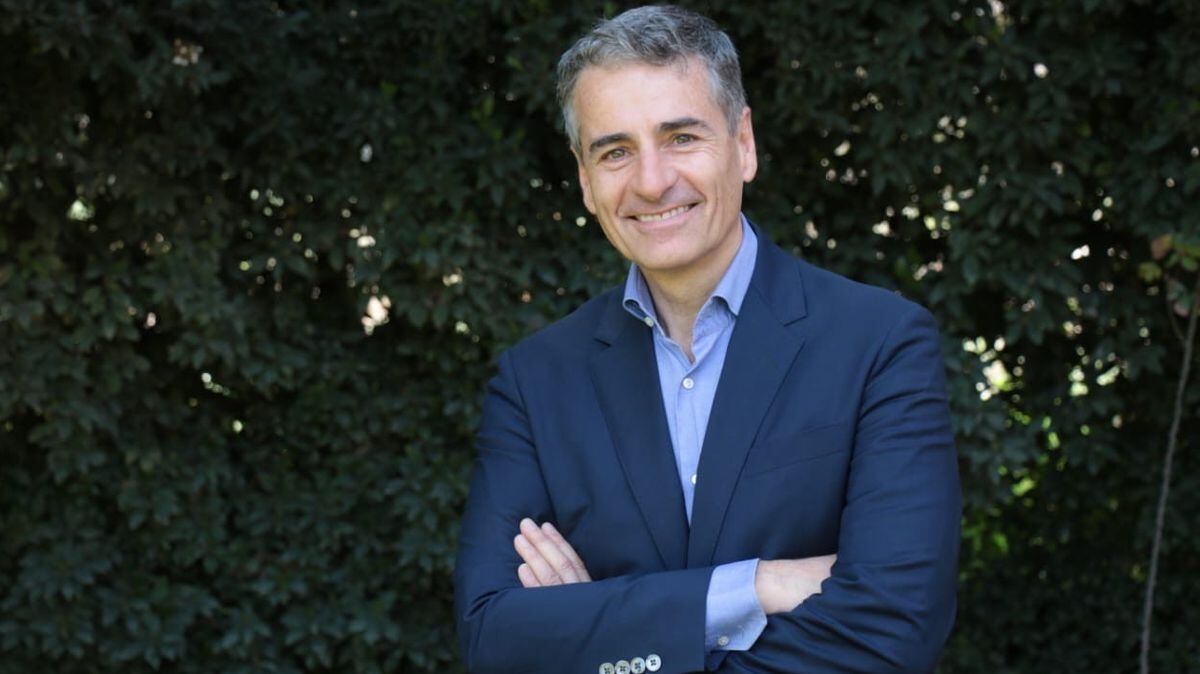The dean of the Institute of Public Policy of the London School of Economics, Andrés Velasco, poses in London.
Economist Andrés Velasco (Santiago, 62 years old) was one of the best technical staff of the Concertación, the center-left bloc that ruled Chile for two decades after the dictatorship.
He was Minister of Finance in the first government of the socialist Michelle Bachelet (2006-2010) and today, unlike the former president, but like many in this political sector, he is about to reject the proposal for a new Constitution in the plebiscite this Sunday.
Dean of the Institute of Public Policies of the London School of Economics, from the British capital talks by videoconference with EL PAÍS about his reasons for rejecting the new text and continuing as of Monday with a new constitutional process "for the rest of the 21st century and beyond".
Ask.
You are a center-left liberal.
Why will you reject the proposal of the convention that will be plebiscitated this Sunday?
A.
For any progressive liberal, the quality of politics and the strength of democratic institutions are paramount.
The constitutional convention proposes a political structure that could increase conflict, weaken certain democratic controls and make it even more difficult to make collective decisions based on future criteria.
Chilean politics is already bad.
With this Constitution it is likely to be even worse.
Q.
And what rules do you find most worrying?
R.
The absence of any rule on political parties and the electoral system is a serious and incomprehensible omission.
It is like writing the soccer regulations without specifying how many players can enter the field and under what conditions.
The tremendous asymmetry of powers between an omnipotent Chamber of Deputies and Deputies and a meager successor to the current Senate weakens essential balances and does not augur quality legislation.
The so-called presidential concurrence laws would make it difficult to control spending and public debt.
The configuration of the judicial apparatus opens the door for political interference in this power of the State.
Those are four examples.
There are many more.
P.
Economists of international renown, such as Thomas Piketty, have expressed their support for the proposal because, they say, it ensures "sustainable growth and shared prosperity for Chile."
How do you explain that from outside the borders you have that perception of the text?
R.
That perception is not shared.
Upside down.
The British weekly
The Economist
, whose experts have followed Chile for decades and know the country well, concluded that the proposed constitution is “ridiculously broad” and a “confusing jumble”.
The
Financial Times
called the text "radical" and "seriously flawed".
The
Washington Post
advised to write it again.
There are foreign opinions for all tastes.
But much more important is the opinion of Chilean citizens, which we are going to know this September 4.
P.
How is it understood that part of the center-left that was part of the Concertación governments is in the option of rejection, like the right?
A.
This is not a teen party that you may or may not want to attend depending on who was invited.
It is the most important decision for Chile since the 1988 plebiscite that removed Pinochet from power.
The 1980 Constitution is dead, politically speaking, since more than 78% voted in favor of drafting a new Constitution in 2020, in the entry plebiscite.
The question now is whether the text proposed by the convention is what Chile needs.
If it is the right Constitution for the rest of the 21st century and beyond.
A good part of the center-left –and, apparently, a good part of the citizenry– has concluded that it is not.
Q.
Former President Michelle Bachelet, of whom you were Minister of Finance, is about to approve.
What are these leaders overlooking?
R.
As President Boric said very well, both options are legitimate.
Former President Bachelet is within her rights to adopt that position.
But former president Frei, also of the center left, has announced that he votes rejection.
Former President Lagos, a socialist, has not said how he will vote, but he has made it clear that the constitutional text seems to him to be deficient.
And there are dozens of current and former center-left parliamentarians, as well as countless former ministers from the same sector, who are in favor of rejection.
This is because the proposed text is not as progressive as it seems.
And, in addition, it risks weakening the functioning of democracy, an issue that for the center-left is essential.
P.
If the text is approved, what would be the short, medium and long term economic consequences for Chile?
R.
The main and most immediate consequences would be political.
The economy moves to the rhythm of the rules designed by politics.
If the performance of politics is mediocre, it is likely that the performance of the economy will be as well.
The proposed constitutional text contemplates a powerful catalog of fundamental rights, which I welcome.
But if the political system gets stuck, we run the risk that those rights remain only on paper.
It is the perfect recipe for citizens to become frustrated and to lose confidence in democracy.
P.
Does it open the way to political extremes?
R.
The other risk is that a left-wing identitarian constitution provokes a right-wing identitarian and populist reaction.
Last year, a far-right populist candidate [José Antonio Kast] won the first presidential round and got 44% of the vote in the second round.
He did so by appealing to the same rhetoric as Trump in the United States and Bolsonaro in Brazil.
In the scenario of a triumph of approval, that is the right that would come out stronger.
P.
The ruling party committed to a series of reforms to the proposed new Constitution, if approved.
Aren't these commitments enough?
R.
Regarding the main challenge, which is the redesign of the political system, the ruling party only promised to "analyze" changes, which means little or nothing.
In addition, shortly after, the president of one of the main government parties [the Communist Party] came out to clarify that they cannot guarantee that this commitment will be fulfilled.
What reflects human nature: if a party feels that this text is theirs, it is understandable that the day after the plebiscite they do not want to modify it.
Q.
What do you think would be the best mechanism to continue with the constituent process, if you win rejection?
R.
The triumph of the rejection would not be the end of the constitutional process, but the beginning of a second stage.
I think that an exit plebiscite would be necessary, but not an entry one.
The convention must be elected in another way, with an electoral system of closed and parity lists, with a new formula to calculate the number of seats reserved for indigenous peoples, and with different rules for independents, so as not to repeat the errors of the recent past.
And since you're not starting from scratch, the convention could do its job quickly.
In a year or less, Chile could have the Constitution it needs and deserves.
P.
In what position is the Boric Government after the plebiscite?
R.
Whoever wins wins, half the country will be dissatisfied with the result.
The process has increased the divisions between people instead of reducing them.
Those are messages that the Government must pick up.
They seem like a complication, but for President Boric, they also turn out to be an opportunity.
An opportunity to help heal those wounds, renew his Cabinet, recalibrate the coalition that supports him, giving more weight to democratic socialism and, in the event that the rejection succeeds, to lead the second stage of the constitutional process together with Congress.
Subscribe here to the EL PAÍS América
newsletter
and receive all the key information on current affairs in the region.





/cloudfront-eu-central-1.images.arcpublishing.com/prisa/5L64CXT2UUXH5LSF3WP6EFCMTA.jpg)
/cloudfront-eu-central-1.images.arcpublishing.com/prisa/OCS7V4Q6YKB6UMI76BXPPNGQJE.jpg)
/cloudfront-eu-central-1.images.arcpublishing.com/prisa/RK3AI2H26NFTRJ3VH3EVPP573E.jpg)

